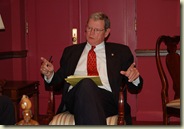 I don't have it in front of me, but the filmmaker Sergei Eisenstein once wrote something close to "Once montage was everything; now it is nothing." Montage is editing and its use a major feature of Soviet (and Eisenstein's) silent cinema. But montage as Eisenstein used it allowed for ambiguity and Stalin's regime found that threatening. Thus came Socialist realism and many years of stodgy filmmaking (and art in general) and, most alarmingly, Eisenstein's attempt to fit himself to the new model with the essay that contains that sentence.
I don't have it in front of me, but the filmmaker Sergei Eisenstein once wrote something close to "Once montage was everything; now it is nothing." Montage is editing and its use a major feature of Soviet (and Eisenstein's) silent cinema. But montage as Eisenstein used it allowed for ambiguity and Stalin's regime found that threatening. Thus came Socialist realism and many years of stodgy filmmaking (and art in general) and, most alarmingly, Eisenstein's attempt to fit himself to the new model with the essay that contains that sentence.
Eisenstein's mea culpa may not encapsulate a philosophy to live by - being and nothingness writ large - but it might well illuminate some of the more puzzling aspects of the world around us. For example, consider the debate on Lieberman-Warner bill, which yesterday devolved into partisan bickering and maneuvering for advantage. Before then, though, you got a good sense of everything and nothing in action.
Here is Barbara Boxer of California:
Here ... is a beautiful creature, the polar bear,” she said in a speech on the Senate floor. “And people say, ‘Oh, is this all about saving the polar bear?’ It’s about saving us. It’s about saving our future. It’s about saving the life on planet Earth. And, yes, it is about saving God’s creatures.”
When a politician goes into messianic mode, she's not inviting debate, she's invoking a higher power to validate her argument and make debate irrelevant. If God says climate change is real and must be fixed, who are we to argue? Sen. Boxer is indicating that she believes what she is saying to the extent that she believes in God - and that is, we have no reason to doubt, a whole lot of belief.
That would be everything.
And James Inhofe of Oklahoma:
"Al Gore has done his movie. Almost everything in his movie, in fact, everything has been refuted. Interestingly enough, the I.P.C.C. — on sea levels and other scare tactics used in that science fiction movie — it really has been totally refuted and refuted many times.”
I'm not sure he means the IPCC (Intergovernmental Panel on Climate Change) has refuted its co-Nobel Prize winner Al Gore, because it hasn't, but that Gore's points have in general been refuted, which is at best a mixed bag. (It was a movie, not a white paper - that's more what the IPCC does.)
Anyway, that would be nothing.
I mean these terms as descriptive not evaluative. For Boxer, there is the point that however much pain saving the environment might take - and it could be considerable, as this bill could send a massive shockwave through the economy if not handled correctly - we must do everything we can, and right now, to fix it. For Inhofe, the problem has been vastly overstated and nothing drastic need be done. In his view, the free market and President Bush's focus on long term technology will mitigate man's contribution to global warming - or at least as much as need be given that global warming isn't that much of an issue.
Qualitatively, we'd say Boxer and Inhofe have staked out the outer limits of this debate, with Boxer promising a dire outcome if the bill does not pass and Inhofe almost dismissing it as irrelevant. Clearly, most of the Senate, particularly Obama and McCain, have aimed closer to the center and will be content with the bill if a few amendments get tacked onto it - a whole different issue, as amendments can sometimes stake out so much turf on both sides of an issue as to render the bill incoherent as public policy and a morass of unintended negative consequences. (That's more-or-less what happened with the European Union's first pass at cap-and-trade.)
So there you go. For Boxer, global warming is everything; for Inhofe, nothing. Now, let's see if a bill comes out of all this.
Picture of James Inhofe. We were aiming at something more casual than the usual senator-jabs-at-air thing, succeeded at the casual but got a two-finger jabbing. It must be a senatorial prerogative or something.
Comments
The Pope did speak out in favor of nuclear.
Nuclear power is a good thing, if only for the reductions in sulfur dioxide, nitrogen oxides, particulates and mercury that would occur by replacing fossil sources of energy with uranium or thorium reactors.